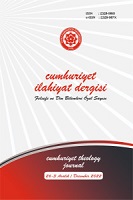Spinoza Etiğinde Upuygun Bir Fikir Olarak “Ahlaki Farkındalık”: Bilinç mi, Vicdan mı?
”Moral Awareness” as an Adequate Idea in Spinoza’s Ethics: Conscious or Conscience?
Author(s): Enes DağSubject(s): Metaphysics, Ethics / Practical Philosophy, Early Modern Philosophy, Philosophy of Mind, Philosophy of Religion
Published by: Cumhuriyet Üniversitesi İlahyat Fakültesi
Keywords: Moral Philosophy; Philosophy of Mind; Spinoza; Consciousness; Conscience; Awareness; Moral Consciousness; Good – Evil; Joy – Sadness;
Summary/Abstract: As in classic Latin philosophical and theological texts, there is no semantic distinction between the concepts of conscientia and conscius in Spinoza’s texts, and it is seen that one is used interchangeably. However, in traditional philosophy the concept of conscientia is used as an “inner voice” or “conscience” meaning “moral sensitivity” or “moral awareness” and expresses both rational and irrational processes. On the other hand, the concept of conscius is used in the sense of “consciousness” and expresses a mental or psychological reflexive activity based on rational processes in the same tradition. This study first and foremost claims that “moral awareness” is formed as a result of reflexive thinking, which is a mental action, based on Spinoza’s use of the two concepts in the same meaning. Where consciousness is understood as a reflexive activity based on the relationship between ideas, it is argued that “moral awareness” occurs in the mind as an idea formed as a result of the relationship between ideas. Secondly, it is determined that Spinoza establish a kind of “moral consciousness” theory based on the awareness in question, rather than a “conscience theory”. The main focus of these claims and determinations is that “good” and “evil”, which are the basic concepts of Spinoza’s ethics, arise from the idea of “joy” and “sadness” that occur as affects in the mind. Here, “joy” or “sadness” are considered as the primary ideas that occur in the mind as a result of the affection of the body, and “good” or “bad” as secondary ideas formed by the mind as a result of contemplation on these primary ideas. In the article, the theory of “moral consciousness” is constructed based on the “ideas of ideas”, which are the secondary ideas in question. Within this framework, I claim that “morality” in Spinoza’s thought is a part of consciousness, and a kind of mental action that takes place in the mind as an “idea”. To justify this claim, Spinoza’s concepts of “consciousness” and “morality” need to be clarified. Accordingly, in Spinoza, “consciousness”, basically expresses a reflexive thought depending on the ideas and affects that occur as a result of the affections of the body. When a person experiences the outside world, s/he perceives the effects of the external bodies that s/he encounters through her/his own body, and these perceptions are expressed as her/his “affections of the body”. Each affection simultaneously corresponds to an idea in the mind. When the mind reflects on these ideas, it forms other ideas, and these ideas that the mind reaches are expressed as the “ideas of ideas”, which includes the awareness of the previous idea. Spinoza’s concept of “consciousness” is based on this “ideas of ideas”. Secondly, “morality” in Spinoza is “the desire to do good generated in us by our living according to the guidance of reason”. Here, the guidance of reason means that “morality” is an “adequate idea” in the mind, and on this basis, the desire to do good means that “morality” is an active and rational desire. Desire is what drives a person to act to do something. Desire is both the conscious appetite or willings of man and his/her “essence”. For this reason, morality is to direct the human essence to the good on the ground of necessity. “Good” are the joys that man is conscious of or aware of. Therefore, morality itself is based on consciousness, and the expression “moral consciousness” is precisely the manifest or conceptual expression of such a consciousness. In this sense, in the article, “moral consciousness” has been put forward as being conscious of one’s own striving to exist (conatus) and appetites (desire), and to act with the determination of desires that express one's own “essence”. This consciousness has been determined as the scope of seeing that the real and fundamental thing is to realize the “knowledge of causes” for a person who experiences the “effect of consequences” and thus falls into an “illusion” by assuming that he/she is free. The scope in question is that man understands him/herself as a part of Nature and realizes the ontological necessity to which he/she is subject, with “adequate ideas”. The possibility of attaining the “joys” that cause “good” rather than the “sadness” that causes “evil” is tied to such a comprehension condition. Therefore, “moral consciousness” basically refers to one’s consciousness of one’s ideas, affects, actions, and more holistically, of himself. One of the highest perfections that “moral consciousness” brings man is the state or affect of “self-esteem”. The affect of “self-esteem” is formed by the idea of being aware of one’s own power to act and seeing that the joys caused by the actions one performs are caused by oneself. In this direction, in the article, “moral consciousness” is put forward as a reflexive idea that is based on “self-consciousness” and in its final stage “self-esteem”. Thus, “moral consciousness” has been identified as the greatest possibility for a person to strengthen his/her own weakness as much as possible.
Journal: Cumhuriyet İlahiyat Dergisi
- Issue Year: 26/2022
- Issue No: 3
- Page Range: 1181-1196
- Page Count: 16
- Language: Turkish

